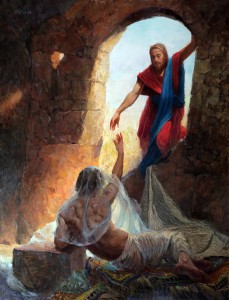Kuwait City, 4-6.04.2014.
Homily of the Apostolic Nuncio
His Grace Archbishop Petar Rajič 
Ez 37:12-14; Rom 8:8-11; Jn 11:1-45
Among the many miracles Jesus performed during his ministry, none amazed people as much as those in which he raised people from the dead back to life. The gospels present three such miracles. The first person who Jesus raised from the dead was a twelve-year-old girl, the daughter of Jairus. The second was an only son of a poor widow in the town of Nain, while the third was Lazarus who had been already buried for four days.
Just before the marvellous miracle of the raising of Lazarus from the dead, Jesus spoke with Martha and Mary, who were distraught over the death of their dear brother. They both said to him in turn Lord, if you had been here, my brother would not have died. The two sisters expressed great faith and hope in Jesus by acknowledging his love and friendship towards Lazarus. These words are significant for us as well, for we can see that Jesus considers each one of us as his friends and loves us. Therefore if we remain united to him, we too shall not die an eternal death, but be raised up to new life.
Even though Martha and Mary were in great sorrow, Jesus told the two sisters and through them he tells us to believe in him, for he is the Resurrection and the Life. To believe that God can raise people from the dead demands extraordinary faith. Jesus provided a clear example of his divine power with the raising of Lazarus, yet this was to be only a foretaste of what lay ahead for him in Jerusalem, where he was soon to die and be raised from the dead.
Jesus wept when he saw the sorrow of Martha and Mary as well as the village folk crying over the death of Lazarus. Jesus shows great emotion here and that he is not a senseless God, but one who understands and shares our sorrows, yet does not remain stagnant in sorrow, but who even in the most difficult situations offers hope for the future. The miracle of raising Lazarus from the dead is thus also very significant for our lives, for the gospel invites us to recognize ourselves in Lazarus, the one Jesus loves and who he weeps over until he lives again.
Jesus said first of all: Take away the stone. He orders that all the barriers and burdens be removed which prevent us from truly living. Jesus is commanding and pleading with us to remove the obstacles that stand in the way between us and God. These are first and foremost our sins, the harmful, bad and evil things which we have become accustomed to and comfortable with; our bad habits which we enjoy maintaining; our false pride which doesn’t let us even admit to ourselves that we have done wrong and that we need help; our arrogance in going so far as to criticize and judge God.
Jesus then said: Lazarus, come out! The Lord calls each of us personally out of the graves and tombs of our existence to the light of day. He transforms us from ‘the walking dead’ into people who are ‘the newly alive’. It is so easy to become weighed down by our sins and habits, to lead a false life of self-contentment, yet this in reality makes us spiritually dead and distances us from God. Jesus tells each of us to come out of this type of existence, in order to be raised up to a new life united with him.
Lastly, once Lazarus was out of the grave, Jesus told the people: Untie him and set him free. God also wants each of us to be totally free, for He is the one who liberates us from the wrappings which bind our lives: our selfishness, pride, false ambition, vanity, self-contentment, greed, lust and all the masks we wear that are our modern “wrappings” or burial cloths. His power is at work within us through the Holy Spirit, calling us to freedom, to a new existence with Christ, the Saviour and Liberator of our lives. As St. Paul writes: If the Spirit of the one who raised Jesus from the dead dwells in you, the one who raised Christ from the dead will give life to your mortal bodies also, through his Spirit dwelling in you.
If Jesus could raise Lazarus from the dead, how much more can he give new life to the living, for he says I am the Resurrection and the Life. Jesus raises us to new life where God becomes the focus and central point of our existence. He becomes our new life when we accept him as Lord and live according to his teachings and commands. No difficulties, hardships, sufferings or even death, can therefore harm us when we believe and trust in the love of God for us, because it is more powerful than death. Love is stronger than death! It goes beyond and surpasses it, but this new life demands that we die to our past, to our sins, and make a sincere return to God, with faith in Christ the Lord and by invoking and allowing the Holy Spirit to dwell in us.

